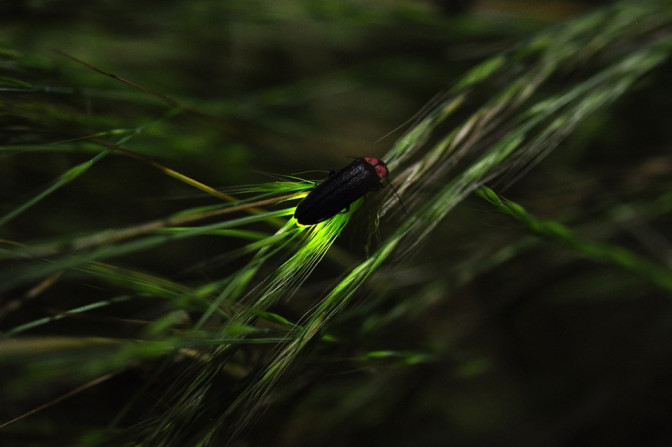Fireflies, also called lightning bugs, have a way of flicking on and off their lights, making them truly enchanting.
However, these gentle insects are more than just nature’s light show. They’re also helpful garden companions.
Sadly, their numbers have been declining in many areas. This decline is due to habitat loss, pesticides, light pollution, and other factors [1].
This article highlights the benefits of fireflies and how to attract them to your yard or garden.
The Beauty and Wonder of Fireflies
Fireflies belong to the family Lampyridae. Their glowing light—called bioluminescence—is one of nature’s most fascinating features.
They produce light through a chemical reaction in their lower abdomen [2].
The result is a soft, mesmerizing glow. Fireflies use this light to attract mates and communicate with each other.
Each species also has its own distinct flash pattern. It’s almost like a secret language in the night sky.
Fireflies bring back childhood memories for many. People recall chasing their glowing lights or catching them in jars.
Firefly Garden Benefits
But beyond nostalgia, fireflies play a vital role in the environment. Their larvae (glowworms) are natural pest controllers.
Pest Controllers
Firefly larvae—known as glowworms—are natural pest controllers. They are tiny predators that feed on pests like slugs, snails, and worms.
These larvae live in damp soil and leaf litter, quietly hunting garden pests that damage plants and flowers.
Healthy Ecosystem
Fireflies also serve as a sign of a healthy ecosystem. Their presence often indicates that the soil is rich in organic matter and moisture.
When fireflies are abundant, it usually means the habitat is thriving and balanced.
Pollinators
Some adult fireflies feed on nectar and pollen from flowers. Thus, they transfer pollen from one flower to another as they move about.
This helps support plant reproduction and biodiversity in your garden.
Add Beauty to Your Yard
There’s no denying that fireflies bring natural beauty to your home. Their glowing lights create a warm, inviting atmosphere that enhances your yard’s appearance.
Seeing fireflies blink and glow among your plants adds a magical touch to your outdoor space.
How to Attract Fireflies Naturally
Unfortunately, firefly populations are declining around the world [3]. Scientists point to the leading causes: habitat loss, pesticide use, and light pollution.
The good news is that you can make a difference. Create a welcoming space that helps fireflies survive and multiply.
1. Create the Right Habitat
Fireflies thrive in areas with moisture, shade, and natural vegetation. To attract them, consider leaving some parts of your garden a bit wild.
Avoid cutting grass too short. Also, allow patches of tall grass, wildflowers, or native plants to grow. These areas provide cover and protection for both adult fireflies and their larvae.
Moisture is also essential. Fireflies are drawn to damp places. Their larvae require soft, wet soil to burrow and hunt for prey.
If you live in a dry area, you can create moist spots. Install a small pond, birdbath, or even a low-lying area that collects rainwater. Just be sure to avoid adding fish to ponds, as they may eat the larvae.
Leaf litter, rotting logs, and mulch also provide excellent habitats. Instead of raking every fallen leaf, allow some to stay on the ground under shrubs or trees. This creates the perfect hiding place for glowworms while also improving soil health.
2. Eliminate Pesticide Use
It’s also best to avoid using pesticides or herbicides in your garden.
These products can kill fireflies. They can also kill the small insects and snails that their young rely on for food.
Instead, consider natural pest control methods. For example, you can bring in beneficial insects and use floating row covers.
You could also encourage birds to visit your garden.
3. Keep It Dark At Night
Fireflies need the darkness to communicate and find mates [4].
Artificial lighting confuses them. Lights like bright porch lights, garden spotlights, and even nearby streetlights can interrupt their communication process.
Therefore, to help them, turn off unnecessary lights after sunset. You can also use fewer exterior lights.
4. Choose Firefly-Friendly Plants
Planting firefly-friendly plants can also increase their population.
Fireflies like areas with native plants, trees, and shrubs. These places offer shelter and food for other insects.
Therefore, planting a variety of native grasses, ferns, and flowers can help create an ideal environment for them.
Flowers that attract fireflies include black-eyed Susans, asters, monardas, cardinal flowers, and goldenrods.
Moreover, tall plants and shrubs provide resting spots during the day. Shaded areas also help keep the soil cool and damp.
5. Limit Lawn Chemicals and Excess Mowing
Many people love the look of a perfectly manicured lawn. However, constant mowing and fertilizers can make it hard for fireflies to survive.
Their larvae need undisturbed soil and organic debris. Therefore, mowing less often can give them a better chance to thrive.
Takeaway
Fireflies are among the beneficial insects around.
Creating a garden or yard that welcomes fireflies is more than just enjoying their beauty. It’s about restoring balance and harmony to the environment.
Every little change you make supports the survival of these glowing insects. For example, turn off outdoor lights and steer clear of pesticides.








Add comment